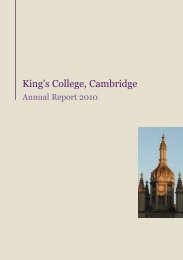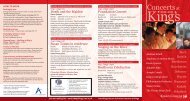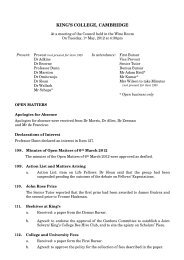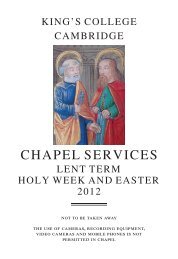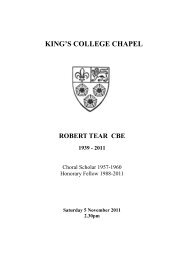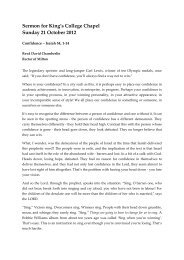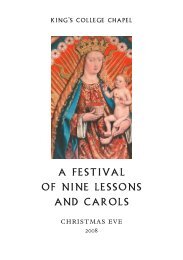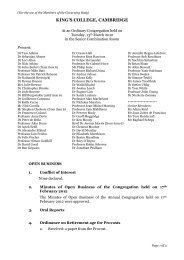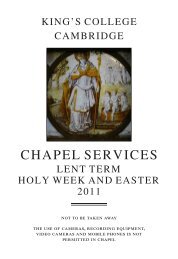Part 2 (Obituaries) - King's College - University of Cambridge
Part 2 (Obituaries) - King's College - University of Cambridge
Part 2 (Obituaries) - King's College - University of Cambridge
Create successful ePaper yourself
Turn your PDF publications into a flip-book with our unique Google optimized e-Paper software.
152<br />
OBITUARIES<br />
diets <strong>of</strong> different ethnic groups in South Africa in 1955. Already in 1953<br />
Ancel had published a seminal study linking the intake <strong>of</strong> animal fats with<br />
the risk <strong>of</strong> heart disease. The message that a proper diet and exercise<br />
prevented heart disease had started to gain attention in the media at the end<br />
<strong>of</strong> the 1950s. Ancel and Margaret further popularised their findings in the<br />
1959 book Eat Well and Stay Well. In 1961 Ancel peered out at a hamburgerloving<br />
post-war USA from the cover <strong>of</strong> Time magazine; he was well on his<br />
way to gaining his ironic nickname “Mister Cholesterol”.The success <strong>of</strong> Eat<br />
Well and Stay Well by the Keys was followed by books like The Benevolent Bean<br />
(1967) and Eat Well, Stay Well the Mediterranean Way (1975), which included<br />
practical tips and recipes for a non-specialist audience. Ancel retired from<br />
the <strong>University</strong> <strong>of</strong> Minnesota in 1972 but continued to work and published<br />
his last findings in 2000.<br />
The work <strong>of</strong> Ancel and his wife Margaret led to the realisation that the<br />
epidemic <strong>of</strong> coronary disease could be prevented. Their contribution to<br />
science and preventive medicine ranks as among the most important <strong>of</strong> the<br />
last century.Ancel was a brilliant and driven man whose impatience resulted<br />
in a brutal frankness, and he could not have always been easy to work with.<br />
His findings were, and are, challenged from many directions, but regardless<br />
<strong>of</strong> the final outcome <strong>of</strong> the scientific debate concerning heart diseases, his<br />
contribution will forever be a seminal one as it was the first to make the<br />
argument that coronary disease can be linked to diet and lifestyle choices.<br />
Towards the end <strong>of</strong> his life he lived for long periods at a house he had bought<br />
outside Naples, keeping fit and enjoying the Mediterranean diet that he had<br />
spent so much energy promoting. He was survived by Margaret, his son<br />
Henry and daughter Carrie, eight grandchildren and six great-grandchildren.<br />
Another daughter died in 1991.<br />
PAUL KOVESI (1960), who became a cherished and respected pr<strong>of</strong>essor <strong>of</strong><br />
English in Western Australia after having learned the English language as an<br />
adult, was born in Hungary in late November 1926.



